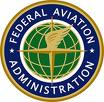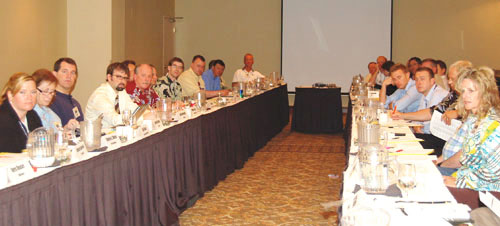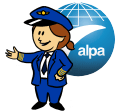| Problem viewing/PDA users,
click here. |
 |
|
News from ALPA International |
|
April 2, 2010—In This Issue:
|
|
|
Legislative Bankruptcy Reform Update |
|
|
 Last
week, ALPA president Capt. John Prater was scheduled to
testify at a hearing regarding the Protecting Employees and
Retirees in Business Bankruptcies Act of 2010 (H.R. 4677).
The hearing was postponed and will be rescheduled. Last
week, ALPA president Capt. John Prater was scheduled to
testify at a hearing regarding the Protecting Employees and
Retirees in Business Bankruptcies Act of 2010 (H.R. 4677).
The hearing was postponed and will be rescheduled.
This comprehensive bankruptcy reform legislation, if enacted, will provide
pilots with powerful tools such as restoring the right to strike and to seek
damages for breach of their labor agreements in case of imposed changes to
working conditions, and provides bankruptcy judges with much-needed guidance to
ensure that the rights of workers and retirees receive the attention we deserve
during the bankruptcy process.
The legislation will ensure that employee sacrifice is shared, truly
necessary, and doesn't overreach. The legislation will also stop management from
rewarding itself with millions of dollars in bonuses for running our companies
into bankruptcy. Bankruptcy laws governing labor agreements have not been
amended in over 25 years. We now have a presidential administration and a
Congress that have expressed interest in fixing the injustices workers face
during a corporate bankruptcy.
Most importantly, H.R. 4677 has a realistic chance of passing the House and
Senate and being signed into law by President Obama. It will require that pilots
get active, mobilize, and contact our members of Congress. H.R. 4677 is the only
piece of bankruptcy legislation that has been introduced on behalf of workers
and retirees in both the House and Senate. ALPA supports this realistic and
comprehensive legislation on behalf of all workers.
Return to top
|
|
|
FAA Revises Policy on Antidepressants for Pilots |
|
|
 The
Federal Aviation Administration announced that it is easing restrictions on a
ban that prohibits active pilots from taking antidepressants. The change in
policy is prompted by the reduced risk of anti-depressant side effects, such as
drowsiness, and a need to "change the culture and remove the stigma," according
to FAA Administrator Randy Babbitt. The
Federal Aviation Administration announced that it is easing restrictions on a
ban that prohibits active pilots from taking antidepressants. The change in
policy is prompted by the reduced risk of anti-depressant side effects, such as
drowsiness, and a need to "change the culture and remove the stigma," according
to FAA Administrator Randy Babbitt.
Click here to read the FAA press release.
Return to top
|
|
|
Nearly 400 Pilots, Flight Attendants Picket Dulles to Protest Outsourcing |
|
|

Click on the image to view a
photo
slideshow of the picketing. |
Nearly 400 United pilots, their ALPA brethren, and
United flight attendants converged on Washington Dulles Int’l Airport last
Sunday to conduct informational picketing to protest the continued outsourcing
of pilot and other airline employee jobs.
ALPA pilots from Delta, Continental, Air Tran, Mesa, Colgan Air, Trans
States, and Aer Lingus, as well as some from American of the Allied Pilots
Association, joined United pilots in an informational picket line that stretched
nearly the entire length of the front of the Dulles terminal.
The picket coincided with the March 28 launch of the inaugural flight of the
Washington, D.C.-to-Madrid route that is part of the United/Aer Lingus joint
venture. This arrangement allows United to collect revenue without using United
pilots or aircraft.
(For
more information, please click here.)
Return to top
|
|
|
ALPA CIRP Meets in Phoenix |
|
|
Critical Incident Response Program (“CIRP”) MEC chairs from numerous airlines met for in Phoenix, Ariz. on April 1-2. The
ALPA CIR Program was created to provide immediate support to pilots who experience a “critical incident”—an event in or out of the cockpit, which has the potential to cause a stressful impact sufficient to overwhelm the usually effective coping skills of the affected individual or group. Almost all ALPA pilot groups have adopted the program and it is credited with helping many pilots successfully return to the cockpit after an accident or incident.
Nearly 45 pilot, management, and other industry representatives participated in roundtable discussions and training, which were led by CIRP Chair Louise Cullinan (MAG) and CIRP Vice-Chair Jim Woodke (EGL). Discussions focused on lessons learned from the past year, while training centered on successful CIRP tools and tactics. Additionally, Sharon Bryson, director of the NTSB Office of Transportation Disaster Assistance, gave a briefing on family assistance provided in the event of a tragic accident.

Return to top
|
|
|
Spread the Word about Corporate Angel |
|
 Corporate Angel pairs cancer patients who need transportation to treatment with corporations that are willing to share empty seats on their corporate planes. More than 500 corporations make their planes available to the organization, including half of the Fortune 100. They also fly patients through private and fractional jet owners. Through the generosity of these companies and individuals, Corporate Angel is able to fly more than 200 patients a month to specialized and often life-extending treatment. Corporate Angel pairs cancer patients who need transportation to treatment with corporations that are willing to share empty seats on their corporate planes. More than 500 corporations make their planes available to the organization, including half of the Fortune 100. They also fly patients through private and fractional jet owners. Through the generosity of these companies and individuals, Corporate Angel is able to fly more than 200 patients a month to specialized and often life-extending treatment.
But every empty seat is a lost opportunity. There are many patients who aren’t aware of the service they provide, and there are many corporations that aren’t yet part of the network. Sometimes it’s a relative or friend of a patient who hears about Corporate Angel and helps to spread the word. Sometimes it’s a corporate executive, a pilot, or a flight department employee who encourages a corporation to join the network and offer an empty seat to a cancer patient. The more people know about Corporate Angel, the more cancer patients they can help!
Click here to read more about this important charity.
Return to top
|
|
|
This Week’s ALPA Press Releases |
|
|
|
|
|

The April 1960 issue of The Air Line Pilot magazine includes Russian Capt. Alexis Yakimov’s brief review of the Boeing 707. Six months earlier, United pilot John Stefanki, provided his impressions of the Russian Tu-114 turbo-jet, having flown with Yakimov from Moscow to New York. Stefanki returned the favor, but the Russian pilot was not impressed with what he saw. Yakimov described the 707 as “too low (referring to the cockpit ceiling), too slow, too complicated, and in conclusion, not refined enough for Russian use.”
Return to top
|
|
|
Feedback & E-mail Address Changes |
|
| Questions or comments on this FastRead? Give us your feedback at
communications@alpa.org. If you have moved or changed your ISP or e-mail
address, please update your ALPA records. If you don’t, you
will no longer receive the ALPA FastRead and other e-mail bulletins and notices,
and once your postal forwarding order expires, you’ll no longer receive the
magazine and other ALPA mail. You can do it yourself by going to
www.alpa.org and logging
in. Go to “My ALPA” in the menu at the top of the page, and from there, you’ll be
instructed how to make the necessary changes. If you don’t have access to the
members-only section of
www.alpa.org, you can
e-mail your requests by sending them to
membership@alpa.org. Be sure to include your member number or enough other
information so that we can identify you in the membership database, and tell us
what information needs to be updated. Please note that it is not sufficient
just to notify your LEC or MEC of these changes—you should register them with
the ALPA Membership Department in Herndon. Can’t remember your member number
or how to log in? Need information about your ALPA insurance programs? These and
other questions about ALPA services can be answered by contacting
membership@alpa.org. Return to top
|
|
|
Air Line Pilots Association, Int’l
1625 Massachusetts Avenue NW
| Washington, DC 20036 | 703-689-2270 |
|
 |

